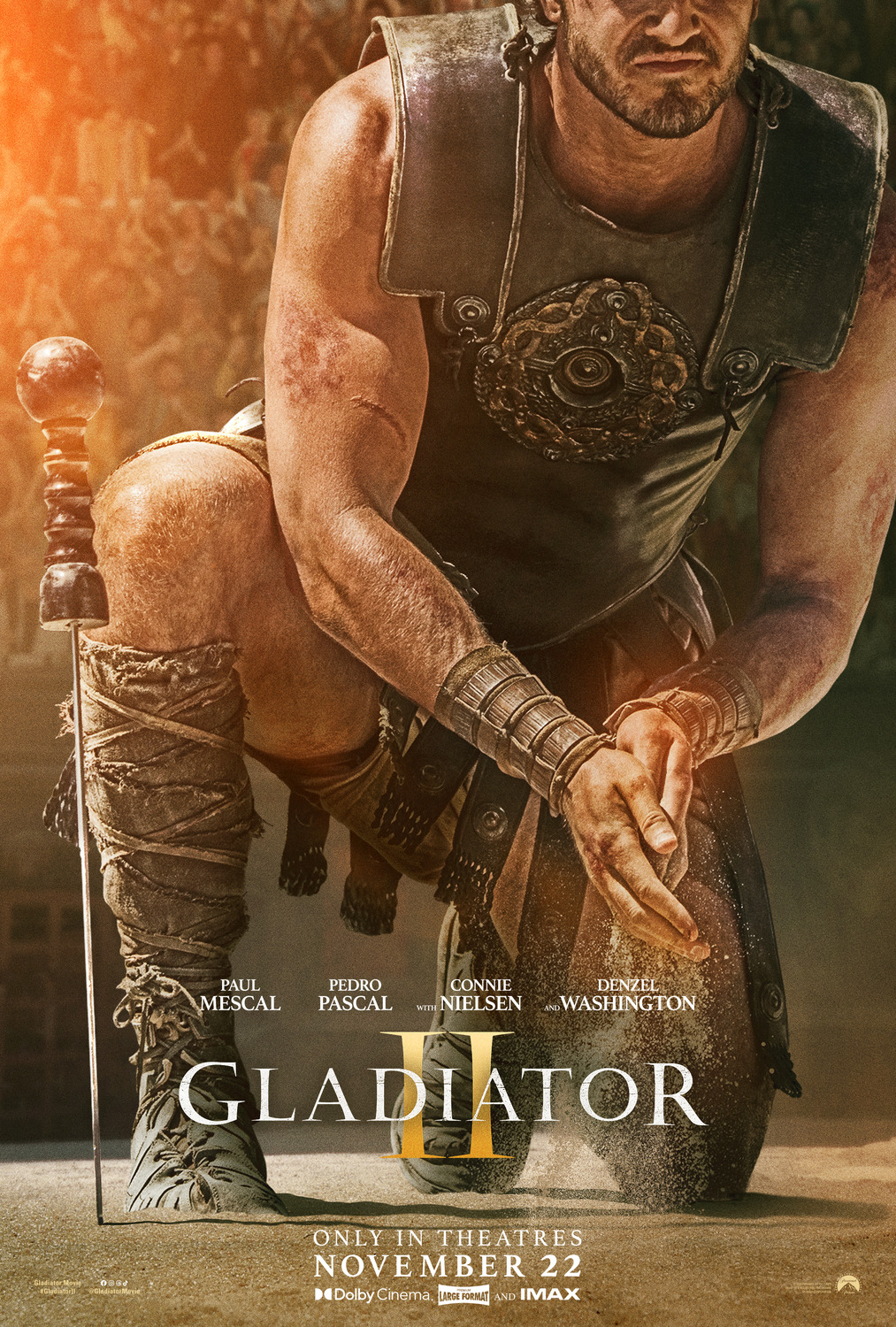Director
Ridley Scott
Starring
Paul Mescal
Denzel Washington
Pedro Pascal
Connie Nielsen
Joseph Quinn
Fred Hechinger
Sixteen years after the events in Gladiator, the young Lucius Verus Aurelius [Mescal] was smuggled out of Rome (for fear of his execution as heir to the throne) and has been living in North Africa under the name Hanno. There he has a simple farmer’s life and has settled down with his wife Arishat [Yuval Gonen]. All of that is destroyed, however, when a fleet of Roman ships invade his town, kill his wife, and enslave his fellow citizens; all led by jaded general, Marcus Acacius [Pascal]. To survive, Lucius is forced to fight as a gladiator and is eventually bought by Macrinus [Washington]; an unscrupulous power broker who has his eyes firmly set on the throne.
The first and most praiseworthy point of note is the sheer scale of production that’s gone into this movie. Gladiator II wears its budget on its sleeve and proudly presents all the scope and spectacle it can to underpin how impossibly massive and unwieldy this empire is. And, as has been proven time and again, Scott is continuing to do something that other directors rarely have the opportunity or inclination to create: rich, practical filmmaking that demands to be viewed on the biggest screen possible. Which, unfortunately falters when resorting to CGI – creepy monkey fight, I’m looking at you. From the towering columns, to the buckets of blood, and a powerful score from Harry Gregson-Williams – effortlessly taking the original’s leitmotifs and adding its own unique flavour – Gladiator II is a true event release in every sense of the word.
The cast are unanimously fantastic but are let down somewhat by limitations in the script and the lack of powerful lines of dialogue that echo in your head after the credits roll. It’s evident Mescal has a commanding presence and is utterly captivating throughout. Similarly, Washington is phenomenal and gives his most energetic and memorable performance since Fences. The dual role of Emperors Geta [Quinn] and Caracalla [Hechinger] are delightfully unhinged and offer a taste of what real corrupted power looks like. And then you have Pedro Pascal as the wartime leader who has grown tired of the empire’s expansion without thought or care for its citizens. Again, a strong showing from Pascal but it falls a little flat. And, in truth, no matter how much screen-time each character gains, the story somehow lacks the weight to instil real emotional traction. And it’s not like the script writing is limited by the events of history because the narrative plays fast and loose with facts. Although anyone looking for period accuracy and a historically faithful representation of Roman rule wasn’t paying attention to the first movie.
As much as Gladiator II dishes out plenty of battle cries, swollen muscles, and gruesome barbarism, it wants to be a film about ideas; the concepts of legacy, the pursuit of vengeance, and the dream of what a city and its people can be. And this is where the film is probably at its most deceptively strongest. When analysing the juxtaposing ideas of Rome embodied in the gulf between Lucius and Macrinus, we see this decadent empire cannot be sustained. Those at the top are maniacal and unhinged, whereas everyone below is suffering in poverty, grime, and graffiti-clad squalor. And at the root of this problem is the combination of undeserved rule and the uncaring hypocrisy of the public. With Macrinus cynically quoting Cicero: the slave dreams not of freedom but of a slave of his own. So on the one hand you have Lucius representing all that Rome can be and should strive for, and on the other Macrinus holding up a mirror, illustrating that Rome has no real desire to change. And as such he is willing to work the system for his own gain.
But these ideas are not seen through satisfactorily. While the third act departs from the original film’s formula, descending into glorious chaos, the handbrake pivot to peace doesn’t feel earned. Unlike Maximus’ story in Gladiator, there are a handful of moving parts that don’t connect as well as we would want. Case in point, Lucius is angry at his mother for sending him away, he wants revenge on Acacius for killing his wife, and he resents Macrinus for making him fight for his life. Every single one of these core character drives is resolved cleanly and abruptly, meaning they never fully capture your heart. And you aren’t left with that surge of adrenaline and sense of exhilaration when our hero succeeds. So, who’s to blame? Well, I think it not only comes down to the script but the sheer pressure of following up a beloved, critically lauded feature. And while Gladiator II follows a lot of the same story beats, it does try to carve its own path in places. But even then, there’s so much reverence and homage to its predecessor, that every encounter feels overly familiar. Now, granted, the problem with Roman history is that it all gets a bit samey after a while, but the shadow of Maximus and his exploits stretch over every inch of this film and my only hope, should there be a Gladiator III (as has been proposed) is that we finally shake loose these shackles and tell a different story about this fascinating behemoth.
Release Date:
UK – 15 November 2024
US – 22 November 2024
The Scene To Look Out For:
For all the carnage in the coliseum, the background political machinations and manoeuvring are just as entertaining and engrossing. With plenty of examples of carefully laid plans falling to pieces and concepts sown early on, pleasingly called back later. Case in point, during a clandestine meeting between conspiring senators, Senator Thraex [Tim McInnery] bluntly states to Lucilla that “politics follows power” and the senate will stand with the coup, providing it works. This is delightfully mocked later when Caracalla appoints his pet monkey as First Consul and the senate erupt in applause despite the utter farce of the situation.
Notable Characters:
There’s one key role I haven’t talked about and that’s Connie Nielsen as Lucilla. Arguably the only real returning character from the first film. Once again she’s trapped in this realm of a woman of power in a man’s world and while I’d like to say there’s a bit more agency to her character here, she’s still subservient to those around her. To the extent she even highlights “one way or another, I’ve had a sword to my neck since the death of my father.” And while she does feel like an instrument of change, there’s not enough meat on the role she’s given to make that more than a prize to be won or a chip to be bartered. Which is a shame.
Highlighted Quote:
“I would sooner face your blade than Roman mercy.”
In A Few Words:
“A perfectly serviceable sequel with commendable performances but ultimately it never gets to the heights audiences will want to see.”
Total Score: 3/5

![The Red Right Hand Movie Reviews [Matthew Stogdon]](https://reviews.theredrighthand.co.uk/wp-content/uploads/2021/12/cropped-header1.png)



